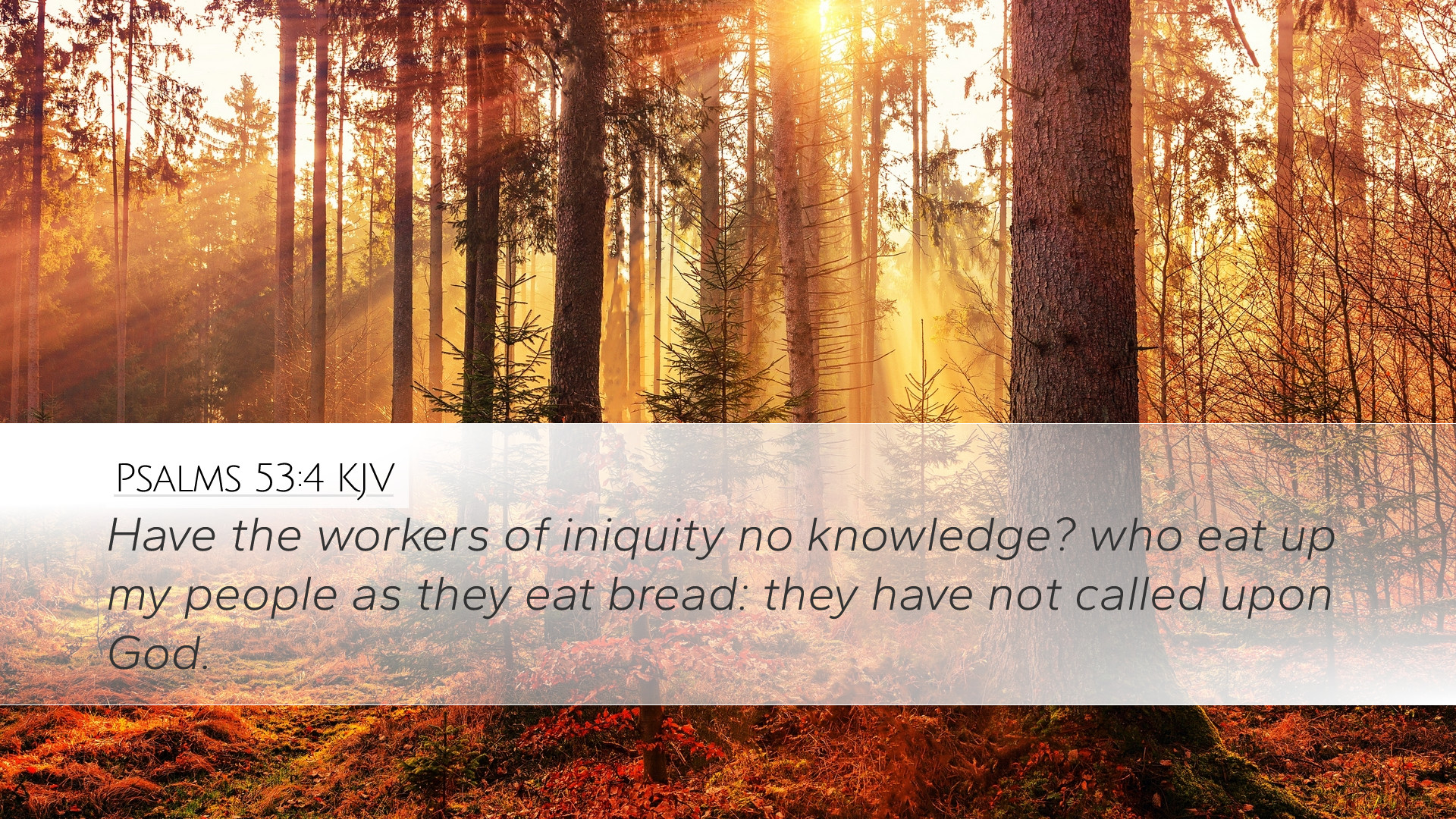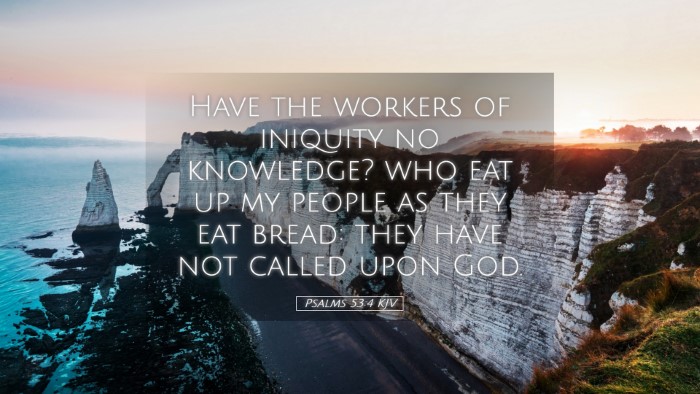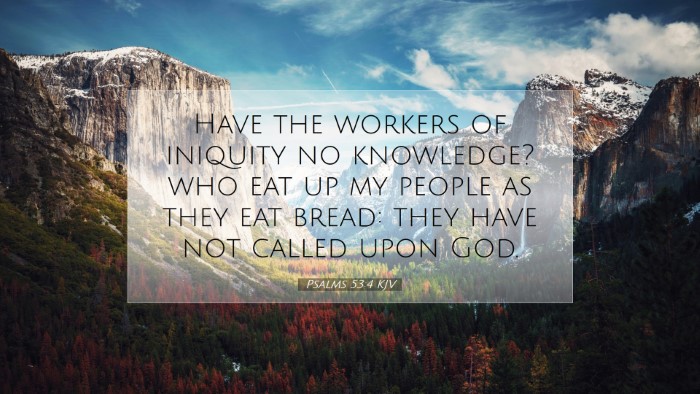Psalms 53:4 Commentary
Verse: "Have the workers of iniquity no knowledge? who eat up my people as they eat bread: they have not called upon God."
Overview
Psalms 53:4 illustrates the profound moral and spiritual blindness prevalent among those who engage in wickedness. The Psalmist poses a rhetorical question that highlights the lack of understanding and awareness among the workers of iniquity regarding their actions against God and His people.
Insights from Public Domain Commentaries
Matthew Henry's Commentary
Henry emphasizes the folly of the wicked, who do not recognize the seriousness of their transgressions. He explains that the dire question: "Have the workers of iniquity no knowledge?" serves as a reminder of their limited perception. In his view, this ignorance leads to the oppression of the righteous, whom they devour like bread.
-
The Nature of the Wicked: Henry articulates that the workers of iniquity are characterized by their utter disregard for God, which results in their moral degradation. Their actions are likened to a consuming fire, indicating their relentless pursuit of sin without consideration of its consequences.
-
Spiritual Appetite: He poignantly describes how the wicked consume the people of God, emphasizing that just as one eats bread out of necessity, they exploit the faithful without thought or empathy. This illustrates a profound spiritual hunger that drives them to malign the innocent.
-
Call to God: Henry points out that one of the most telling aspects of the wicked is their failure to call upon God. This lack of communion with the Divine reflects their estrangement from His grace and mercy, underscoring the seriousness of their plight.
Albert Barnes' Notes on the Bible
Barnes offers a contextual interpretation of this verse, emphasizing the rhetorical nature of the Psalmist's inquiry. He argues that it reflects a deep sense of lamentation over the moral state of society.
-
Rhetorical Question: Barnes notes that the question posed in the verse serves to elicit an emotional response. The Psalmist's disbelief at the workers of iniquity’s ignorance signifies a profound sorrow for the lost.
-
Destructive Behavior: He elaborates on the metaphor of eating God’s people as bread, indicating a systematic and thoughtless destruction of the faithful. This metaphor evokes the idea of nourishing oneself at the expense of others, reflecting true selfishness and depravity.
-
Divine Justice: Barnes believes this verse can foreshadow God’s impending judgment on the wicked. The absence of repentance and acknowledgment of God seals their fate, leading to inevitable consequences.
Adam Clarke's Commentary
Clarke provides a detailed exploration of the language and imagery utilized in the verse. He emphasizes the psalmist's anguish and the stark reality of the corruption surrounding him.
-
Understanding of Knowledge: Clarke interprets "knowledge" in this context as wisdom and understanding of divine truth. The question implies that the ‘workers of iniquity’ lack this fundamental awareness, which is essential for righteous living.
-
The Metaphor of Consumption: He discusses the significance of the phrase “eat up my people,” suggesting that it indicates a complete and merciless consumption. The image is one of the powerful trampling over the weak, highlighting social injustice.
-
Call to God’s Name: Clarke underlines the critical aspect that these workers do not call upon God. This detail asserts the relationship between humanity and the Divine, showcasing that without invoking God's name, one is estranged from inherent wisdom and safety.
Theological Reflections
This verse expresses timeless truths that resonate with contemporary issues of morality and injustice. It serves as a cautionary reminder of the spiritual blindness that accompanies wicked actions and the consequences of ignoring God’s call.
Implications for Today’s Society
-
Moral Accountability: The absence of knowledge among wicked individuals calls for a revival of moral awareness and responsibility within society. Believers are urged to confront ignorance with truth and love.
-
Social Justice: The description of the wicked as those who consume the faithful highlights the need for advocates of justice in our communities, encouraging the church to stand against oppression in all forms.
-
Urgency of Prayer: The mention of the failure to call upon God highlights the essential role of prayer in combatting iniquity. This serves as an encouragement for believers to engage in fervent prayer as an act of faith and reliance on God's intervention.
Conclusion
Psalms 53:4 sheds light on the spiritual condition of those who live in rebellion against God. Drawing from the insights of Matthew Henry, Albert Barnes, and Adam Clarke, we see the multifaceted implications of this verse regarding human morality, social justice, and the necessity of divine interaction. It compels each believer to reflect on their relationship with God and their response to the spiritual realities presented in this passage.


